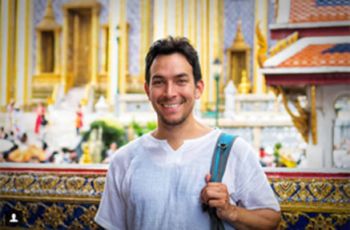
It’s a phrase that Guillermo “Memo” Sanchez, MSHS ’13, MPH ’13, PA-C, tosses out casually: “Creativity and the hard sciences don’t have to be mutually exclusive.
“One of my favorite things about medicine is the many outlets through which we can use our clinical knowledge throughout our careers,” he explains. “Whether it is working for a booming startup in California improving delivery of care, functioning as the team doctor on a Mount Everest expedition, or leading a team to monitor tuberculosis surveillance at the Centers for Disease Control and Prevention [CDC], I’ve seen physician assistants, nurse practitioners, and physicians do incredible things with their careers. After all, clinical knowledge outside the hospital is extremely valuable, and you can be endlessly creative in how you apply it.”
That pull toward creativity has led Sanchez away from traditional health care practice to writing, traveling, and, unexpectedly, public health. “We packed up our things and moved from Washington, D.C., to Atlanta so I could pursue an opportunity with the Office of Antibiotic Stewardship at the CDC,” Sanchez says about himself and his wife, Jacqueline Sanchez, PA ’14, CERT ’14. “The mentorship available and the work you get to do there are wonderful. I ended up loving it so much that my career focus has shifted entirely to public health.”
After several years of working at the CDC in the Office of Antibiotic Stewardship, the trained dietitian and award-winning essayist accepted a fellowship with the Epidemic Intelligence Service, a two-year postdoctoral training program for health professionals interested in applied epidemiology.
Sanchez pre-matched to the Alabama Department of Public Health, where, as a disease detective, he investigates outbreaks, identifies the likely causes, implements control measures, and collects and shares evidence for prevention of disease.
Presently, he says, he’s thrilled to have the opportunity to broaden his public health experiences and improve his epidemiology and leadership skill sets. At the same time, however, he continues to embrace all things artistic.
“Both in my professional and personal lives, I value having a creative outlet and the intrinsic rewards that come with creating something new and unique,” he says. “My most recent endeavors include photography and videography.
Through @twogoroundtheworld, for example, the Instagram account he shares with his wife, Sanchez chronicled their six-month journey trotting the globe, hitting hot spots that included driving the Great Ocean Road in Australia and trekking up to Everest Base Camp in Nepal. Sanchez, in pursuit of his new hobbies, packed his drone for the journey. In one video, he flies it over the streets of Istanbul, capturing the domes of famous landmarks Hagia Sophia and the Blue Mosque, as well as the sparkling waters of the Bosphorus Strait, which separates the Asian and European sections of the well-known city.
“Having worked in a large urban emergency room, and seeing how quickly good health can be taken away from you, I was very motivated to learn firsthand about other cultures, to travel to the places I’ve always wanted to go, and to creatively capture my stories and experiences in photos and video,” he says.
Ultimately, Sanchez has found that working in medicine has made his art better, and that his art makes him a better clinician for his patients.
His distinctive approach to life, and the natural pairing of medicine and art, is possible for anyone, Sanchez adds. Take advantage of the opportunities that arise as health care delivery evolves to incorporate new and perhaps unconventional ideas, he suggests. “Don’t be afraid to take an imaginative approach toward employment. It’s easier than ever for individuals to pursue nontraditional medical career paths.”
To do what you love and to love what you do, Sanchez concludes, is the ultimate goal.


